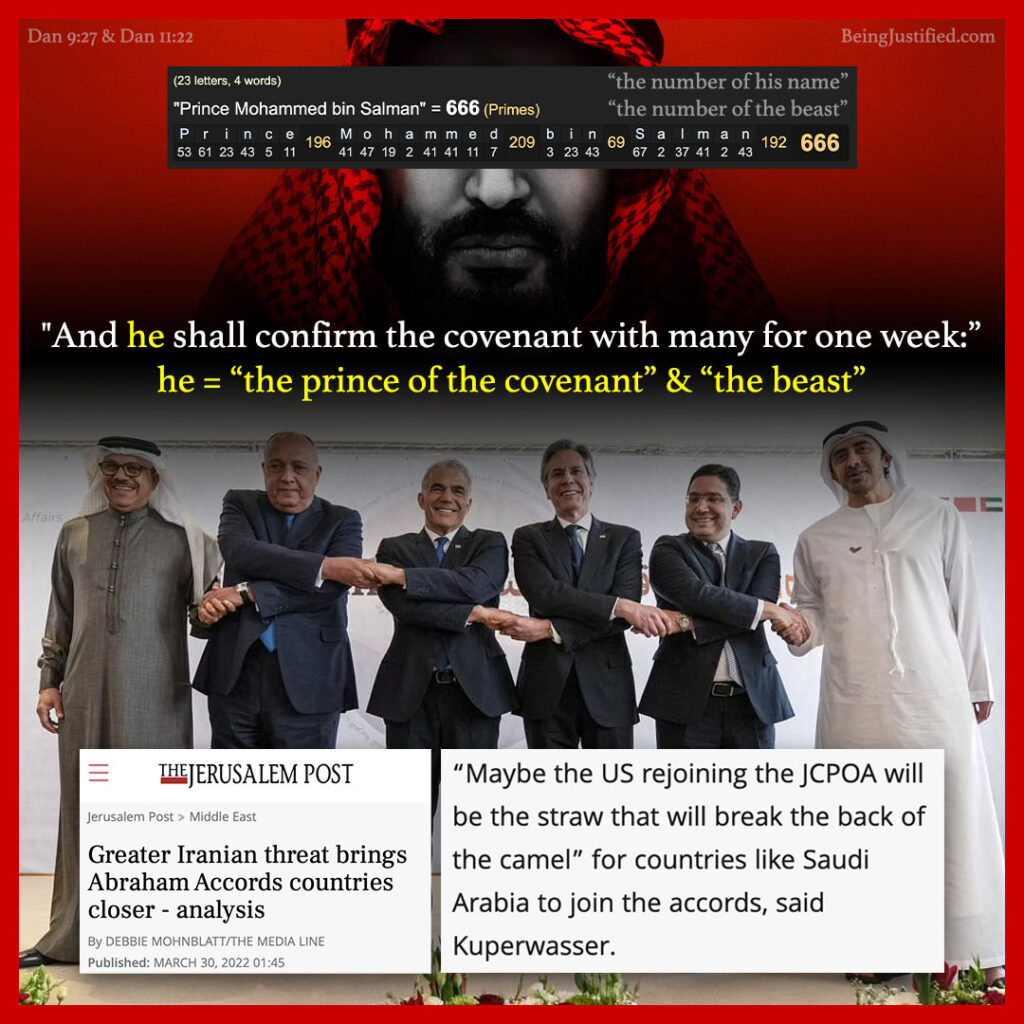Scripture to consider before this special analysis:
“And he shall confirm the covenant with many for one week: and in the midst of the week he shall cause the sacrifice and the oblation to cease, and for the overspreading of abominations he shall make it desolate, even until the consummation, and that determined shall be poured upon the desolate.”
The he that will confirm the covenant with many is the beast from the book of Revelation and the prince of the covenant from the book of Daniel. And that prince is looking to be Prince Mohammed bin Salman of Saudi Arabia.
This report will cover how Iran is being used to bring the beast closer to confirming the covenant with Israel, and that covenant is looking to be the Abraham Accords, and once that happens, the final prophetic 70th week will start and conclude in about seven years with the second coming of the Lord Jesus Christ in flaming fire.

Now unto the special analysis:
With the specter of a revived Iran nuclear deal approaching, Israel hosted a summit on Monday that took place in Sde Boker in the Negev desert, which included the foreign ministers of the Abraham Accords countries and Egypt, together with US Secretary of State Antony Blinken.
The summit is part of a recent tendency by the signatories to the Abraham Accords – Egypt, Bahrain, the United Arab Emirates, Morocco, Israel and the United States – to improve their ties through a series of cultural events, diplomatic visits and summits.
Experts said that this tendency may be related to the growing, shared threat from Iran, as a renewed nuclear deal between the Islamic Republic and the world powers is believed set to be approved in the near future.
General Yossi Kuperwasser, director of the project on regional Middle East Developments at the Jerusalem Center for Public Affairs, former director-general of the Israeli Strategic Affairs Ministry, and head of the Research Division of the IDF Military Intelligence Directorate, told The Media Line that all of the Abraham Accords member countries face a threat coming from the same actor, Iran.
He stressed that the threat is not the same for each country.
“Iran wants to get Israel wiped off the map, while it doesn’t use the same language concerning the other countries that are part of the Abraham Accords,” he said.
However, Kuperwasser continued: “It threatens their security and stability.
The UAE and Bahrain are under immediate Iranian military threat, and Morocco is under a more indirect threat.
The Iranians, from Algeria, are involved in promoting the Polisario Front (a nationalist organization whose main goal is the independence of Western Sahara) and working against the Moroccan interest.”
Hasan Alhasan, a research fellow for Middle East Policy at the International Institute for Strategic Studies (IISS) in Bahrain, told The Media Line that although the Abraham Accords are not a formal alliance, its members, especially Israel, the UAE and Bahrain,share the perception that Iran represents a serious threat to their security.That is why this threat has helped to enhance the relations among these countries, hesays.
“In fact, Iran deserves much of the credit for pushing Bahrain and the UAE closer to Israel,” Alhasan said.Now that reports have suggested that a renewal of the Iran nuclear deal known as theJoint Comprehensive Plan of Action (JCPOA) is imminent, the Abraham Accords countries – who feel threatened by a nuclear Iran – are aligning. “There is no doubt that the alliance between the members of the Abraham Accords is getting stronger in light of the reports of the Iranian nuclear deal’s possibly soon renewal,” said Kuperwasser.
Blinken, who visited Israel to attend the summit, said at press conference with Israel’s Foreign Minister Yair Lapid that, in spite of the possible renewal of the nuclear deal, the US will never allow Iran to obtain a nuclear weapon.
“We are both committed, both determined, that Iran will never acquire a nuclear weapon,” Blinken said in Sunday. However, Israel and its Arab counterparts to the Abraham Accords do not necessarily trust that statement.
Kuperwasser said that Israel and the Arab member countries of the Abraham Accords think that the nuclear deal renewal is very dangerous in many ways.
First, he said, the revived nuclear deal “is going to make preventing Iran from acquiring a nuclear weapon impossible and, when the sunset arrives, the Iranians are going to have any amount they want of high-enriched, even to a military level, uranium.”
Kuperwasser explained that this deal will allow Iran to have the capability to produce as many nuclear weapons as it wants. Otherwise, the Iranians wouldn’t sign it, he argued.
In addition, according to Kuperwasser, “this deal gives Iran so much money that it is going to have the ability to get what they want through having nuclear weapons, even without having nuclear weapons.”
This means that Iran will have enough money to become the regional power in the Middle East and to strengthen its proxies and give them weapons, he explained.
“Even now with economic sanctions, Iran gives its proxies such high priority that they support the Houthis in Yemen, and Hizbullah, and Hamas, and militias in Iran,” he said.
Finally, Kuperwasser says: “This deal means that the Iranians may get strong enough to overcome the ‘big Satan’ of the United States, which means that the US will look weak and unable to confront Iran.”
Alhasan adds that Israel, the UAE and Bahrain also share certain concerns over the Vienna nuclear talks.
“They worry that the Biden administration may remove the Iranian Revolutionary Guards Corps (IRGC) from the US terror list, and provide Iran with tens of billions of dollars worth of sanctions relief, a portion of which Iran would then redirect toward funding armed, non-state groups and proliferating missile and UAV technology in the region,” said Alhasan.
He added that, with Washington firmly focused on clinching a deal with Iran over its nuclear program, the US has said very little about how it intends to mitigate the risk of Iran’s exploiting sanctions relief and reintegration into the global economy to destabilize the region if a nuclear agreement were to be reached in Vienna.
The renewal of the Iran nuclear deal, if completed, could have many implications on the geopolitics of the region.
It certainly will bring together the countries that are already members of the Abraham Accords.
“The future trajectory of the Abraham Accords depends largely on Iran; the more aggressive Iran grows, the more likely it is to push states in the region to shed their historical inhibitions and coalesce with Israel against it,” Alhasan said.
In addition, it could also push other countries who see Iran, and especially a nuclear Iran, as a threat to cooperate with Israel or even join the Abraham Accords.
“Other countries may join the accords, and Saudi Arabia may be one of them. As the threat grows or maybe as the JCPOA is reconfigured and joined by the Americans, maybe that will be one good reason for the Saudis to rethink their position,” Kuperwasser said.
Alhasan said that, in the case of Saudi Arabia, Riyadh’s tense relations with the Biden administration and displeasure over US policy on Iran and Yemen may be partly to blame for the Saudis still not joining the accords.
He added that there is a perception in Israel that the Biden administration has not been as invested in expanding the pool of the accords’ signatories as was the Trump administration.
Alhasan believes that countries such as Oman, Qatar or Kuwait have not joined the accords because they may be worried about provoking Iran, with whom they have working relations.
Kuperwasser attributed the lack of new members partly to the lack of a solution to the Palestinian issue.
He said that waiting for this condition to be fulfilled could have a negative impact on the security of those countries in light of the Iranian threat.
“For the time being they still believe that first they must see some solution to the Palestinian-Israel conflict which is, in my opinion, holding their own security as hostage,” he said.
However, he believes that a renewal of the Iranian nuclear deal could possibly supersede that condition.
“Maybe the US rejoining the JCPOA will be the straw that will break the back of the camel” for countries like Saudi Arabia to join the accords, said Kuperwasser.
